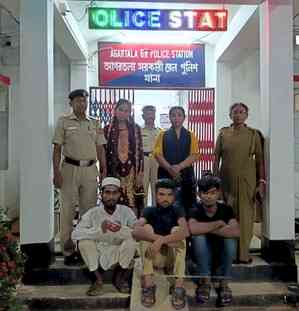5 more Rohingyas held in Tripura after fleeing from B’desh camps
Five more Rohingyas, including two women were arrested from the Agartala railway station, police said on Wednesday.

Agartala, July 10 (IANS) Five more Rohingyas, including two women were arrested from the Agartala railway station, police said on Wednesday.
Acting on a tip-off, the Government Railway Police (GRP) personnel arrested the Rohingyas on Tuesday night for their illegal entry into India from Bangladesh.
“We arrested the intruders just before they boarded a Guwahati-bound train. The Rohingyas said that they intended to go to Hyderabad in search of jobs,” a GRP official said.
The Tripura police on July 4 arrested 25 Rohingyas, including six women and seven children, from two different places in North Tripura District when they were about to board buses to first go to Guwahati and then to Hyderabad by train in search of jobs.
Before illegally entering Tripura, the Rohingyas fled from their camps in Bangladesh's Cox's Bazaar, where more than one million displaced Rohingyas from Myanmar have been living since 2017.
Over 100 Bangladeshi nationals, including women and children, have been arrested from the Agartala railway station for their illegal entry while 30 Rohingyas, including eight women and seven children, were arrested from different places in Tripura in the last two months.
Due to rising infiltration from across the border, Tripura Chief Minister Manik Saha during a high-level meeting last week asked the top Border Security Force (BSF) and police officials to take appropriate measures to prevent infiltration, smuggling, illegal trade and border crimes.
BSF’s Tripura frontier Inspector General, Patel Piyush Purushottam Das, said that physical domination has been augmented with state-of-the-art surveillance technology, including Artificial Intelligence (AI)-enabled cameras and facial recognition tools along the 856 km India-Bangladesh border with Tripura to prevent infiltration, crimes and other illegal activities.
--IANS
sc/rad


 IANS
IANS 








